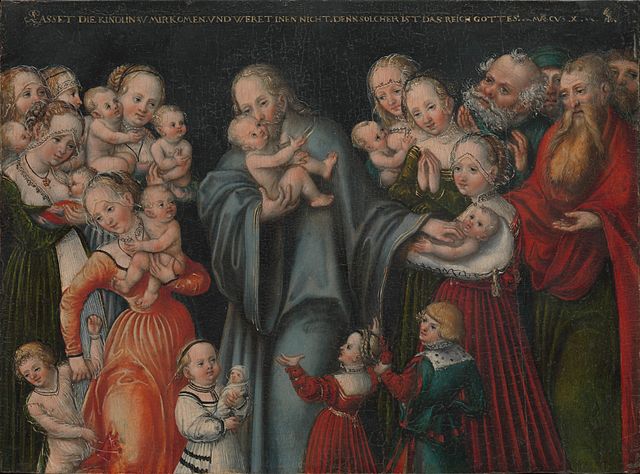
Wikimedia Commons public domain image
Compare John 3:3, 5; 13:20
The idea that we should be childlike has become a cliché. Sometimes we scarcely hear it. And, sometimes, we misuse or misunderstand it.
But, coupled with concepts that the greatest of us should (in a sense) be the least of us, and that leadership consists in service to others, it’s difficult to understate the radical character of Jesus’ teaching on this point.
His notion of greatness represented a dramatic departure from the ideals of the Greco-Roman world and even of contemporary Judaism, and finds very few genuine followers among the leaders and the power-brokers of the world still today. But we shouldn’t merely point to others and congratulate ourselves on our superiority. How are we ourselves doing?
From the Devil’s Dictionary of Ambrose Bierce: “Christian, n.: one who believes that the New Testament is a divinely inspired book admirably suited to the spiritual needs of his neighbor.”

Compare Matthew 10:42
This passage offers a generous charter for making common cause with people whose values align with ours, but whose doctrinal agreements are only partial and approximate.
I’ve been sounding this theme myself for quite a while, in ways big and small, including here and here, but also here — though it seems that I never actually got around to posting my promised “Richard Mouw, Part Two.”

Compare Matthew 5:13; Luke 14:34-35, 17:1-2
1.
The plan of salvation requires “opposition” or “offenses,” yes. But there will be no awards handed out to those who, through their treachery, betrayal, greed, ambition, hatred, and other unrighteous motives, create those offenses and that opposition.
2.
The language of plucking out eyes and cutting off hands isn’t meant literally, but it certainly illustrates the nature of the radical discipleship that Jesus asks of us. (It’s hard to get a faith-only “easy-believism” out of this passage. In fact, I think it would be well nigh impossible to derive a doctrine of salvation-by-grace alone, as it’s commonly taught and understood, from the teachings of Jesus in the four gospels.)
3.
If the salt loses its saltiness, Jesus says, there’s no reason to keep it. It might as well simply be thrown out. If we become like the world — if there’s little or no discernible difference between the Church and the world, between Saints and non-Saints, between the way we see and do things and the way unbelievers do and see things — we’re of little or no specific use to the Lord. However much more pleasing we, our behavior, our publications, or whatever may be to the world.










